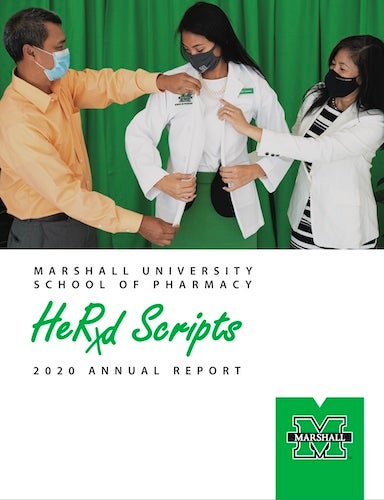Technical Standards for Student Admission, Progression, and Graduation
In accordance with Section 504 of the Rehabilitation Act of 1973 and incorporating the guidelines of the Americans with Disabilities Act of 1990, the Marshall University School of Pharmacy (MUSOP) has adopted minimal technical standards for the professional degree (Doctor of Pharmacy) program.
These standards represent the essential non-academic requirements that a student must demonstrate to successfully participate in the Doctor of Pharmacy degree program and meet the professional competency requirements. These standards are set forth by MUSOP to establish the expectations and requisite abilities considered essential for students admitted to its educational and training program to achieve the levels of competency stipulated by MUSOP, its accrediting agency (the Accreditation Council for Pharmacy Education), and the Higher Educational Policy Commission of the State of West Virginia.
Applicants for admission to MUSOP who are invited for an on-campus interview are required to certify on the day of their interview that they understand and are able to meet the technical standards described herein with or without reasonable accommodations. A description of any actual disability and the need for accommodations should not be disclosed at any time.
An accepted student who has a disability and needs accommodations should initiate discussions with the Office of Disability Services as soon as the offer of admissions is received and accepted. It is the responsibility of an accepted student to provide current information documenting the general nature and extent of his/her disability and the functional limitations proposed to be accommodated. The student must recertify that he/she is able to meet the technical standards with their specific accommodations. The School of Pharmacy reserves the right to request new or additional information.
Reasonable accommodations can be made for students with appropriately documented disabilities. An accommodation is not reasonable if it fundamentally alters the nature of the program by posing a direct threat to the health or safety of self or others, if making it requires a substantial modification in an essential element of the curriculum, if it lowers academic standards or poses an undue administrative or financial burden for the School of Pharmacy. The use by the candidate of a trained intermediary to perform any of the functions described in the Technical Standards would constitute an unacceptable modification as that candidate’s judgment would be mediated by someone else’s power of selection and observation.
Deficiencies in knowledge base, judgment, integrity, character, or professional attitude or demeanor, which may jeopardize patient care, may be grounds for course/rotation failure and possible dismissal. It is the policy of MUSOP that no person shall be denied admission, progression, or graduation on the basis of any disability, provided that the individual demonstrates ability to meet the minimum technical standards set forth herein. Each student must possess aptitude, abilities, and skills in the areas of: 1) observation; 2) communication; 3) sensory and motor function; 4) analysis and synthesis, and 5) professional conduct. MUSOP faculty will monitor maintenance of these standards. Students must be able to perform independently all described functions.
Technical Standards
Observation:
- Must have the ability to independently observe and evaluate materials and processes demonstrated through a variety of activities such as demonstrations, experiments, physical assessments, and professional and clinical practice, in classrooms, laboratories, and patient care areas.
Communication Skills:
- Must have the ability to communicate fluently in oral and written English, be cognizant of nonverbal communications, and to have the ability to work with faculty, peers, patients, and other members of the health care team.
Sensory and Motor Function:
- Must exhibit the appropriate motor function to prepare pharmaceuticals, prepare compound and dispense medications, prepare sterile dosage forms, and perform important aspects of patient assessment.
- Must be able to execute motor movements reasonably required to provide or direct the general care and emergency treatment to patients. Such motor actions require coordination of both gross and fine muscular movements, equilibrium, and functional use of the senses of touch and vision.
Analysis and Synthesis:
- Students must have the ability to identify, analyze, and synthesize and apply relevant information and information technologies in independent professional and health care team contexts that are increasingly realistic and culminate in being able to provide patient care in a variety of professional practice settings.
Professional Conduct:
- Students must have the ability to demonstrate responsible professional and ethical behavior and demonstrate compassion, integrity, and respect for their patients and colleagues, and for the privacy of health care information.
